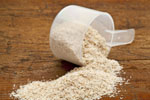 Psyllium is the outer husk from the seed of the plant Plantago ovato. It is available in the health food aisle in supermarkets or in bulk from health food stores.
Psyllium is the outer husk from the seed of the plant Plantago ovato. It is available in the health food aisle in supermarkets or in bulk from health food stores.
Regular consumption of 7-10 grams (two teaspoons twice a day) can reduce LDL cholesterol by between 6 to 18 percent.
Psyllium is 70% soluble fibre (means it dissolves in water) and contains around 8 times more soluble fibre than oat bran. Oat bran has had a lot of publicity in the past regarding its ability to reduce cholesterol levels.
Psyllium works in the intestines where it binds to bile acids (made from cholesterol and aids in the digestion of dietary fats) and then is excreted through the bowel instead of being reabsorbed back into the blood. To make more bile acids, the body uses more cholesterol. This process reduces the levels of cholesterol in the blood. The group of cholesterol lowering medications known as bile acid binding resins use the same mechanism.
Add 1/2 – 2 teaspoons of psyllium to 250 mls (one glass) of water. Mix well. Psyllium thickens rapidly when added to water, so drink immediately before it becomes too thick to swallow. Follow with a second glass of water.
Psyllium should always be taken with a minimum of 250mL (one glass) of water for each teaspoon. If taken with insufficient water, it may cause blockages in the intestines.
Psyllium can also be sprinkled over cereal or muesli, added to stews/casseroles, used in place of one quarter of the flour when baking muffins and cakes or added to smoothies or juice. Commercial product made with psyllium are also available e.g. ‘Guardian’ cereal by Kellogg is 12% psyllium. Psyllium is the base ingredient for several laxatives e.g. Metamucil.
Psyllium can cause bloating or gas when first used, so it is recommended that you introduce into your diet slowly, working up to a full dose over several weeks.
Psyllium:
- should not be given to children under the age of 12 unless on the advice of a doctor.
- may cause choking for people who have difficulty swallowing.
- should not be taken by people who have any gastrointestinal problems.
- may affect the absorption of some medications. Consult your doctor before using if you are on medication.
- has the potential to reduce blood glucose in diabetics. Consult your doctor before using if you are diabetic.
Where to get help
- Your doctor
- Dietitians Association of Australia
